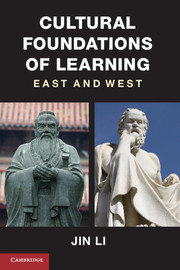Book contents
- Frontmatter
- Contents
- Preface
- 1 Faust and the Birth of a Research Agenda
- 2 Learning to Master the Universe and to Transform Self
- 3 Time Past and Time Present
- 4 Mind-Oriented and Virtue-Oriented Learning Processes
- 5 Curiosity Begets Inquiry and Heart Begets Dedication
- 6 Nerd’s Hell and Nerd’s Haven
- 7 Socratic and Confucian Tutors at Home
- 8 The Devil’s Advocate and the Reluctant Speaker
- 9 Implications for the Changing Landscape of Learning
- Bibliography
- Index
- References
3 - Time Past and Time Present
Published online by Cambridge University Press: 05 June 2012
- Frontmatter
- Contents
- Preface
- 1 Faust and the Birth of a Research Agenda
- 2 Learning to Master the Universe and to Transform Self
- 3 Time Past and Time Present
- 4 Mind-Oriented and Virtue-Oriented Learning Processes
- 5 Curiosity Begets Inquiry and Heart Begets Dedication
- 6 Nerd’s Hell and Nerd’s Haven
- 7 Socratic and Confucian Tutors at Home
- 8 The Devil’s Advocate and the Reluctant Speaker
- 9 Implications for the Changing Landscape of Learning
- Bibliography
- Index
- References
Summary
With the core values of each culture’s learning tradition having been outlined, I now turn to the central question of this book: Do these respective learning traditions still influence the present-day learners? In this chapter, I present empirical research that gives an affirmative response to the question. Research for the past several decades documents specific ways the present-day learners’ beliefs and actual learning processes reflect their respective cultural learning traditions. However, before I present that empirical research, it is necessary to address some important questions about current education practice in China (and by extension, in East Asia as a whole) that may lurk in the minds of readers.
CHANGED CURRICULUM AND INCREASED COMPETITION
No one disputes that times have changed and that ancient values have undergone significant changes in much of the world. East Asia and the West are no exception. Yet, at least with regard to intellectual pursuit, the West has not undergone changes as radical as East Asia has, as noted in Chapter 1. In fact, there is little regarding approaches to learning that the West has adopted from other cultures. Admittedly, educational content in the West – that is, what children learn about – has opened up to knowledge of other cultures and ethnic groups. Clearly, the most notable changes the West has witnessed are the broadening of compulsory education to all and the elevation of achievement standards for all. Yet, we do not have evidence that any Western country has put in the core of their curriculum to teach children, for example, how to study as a Confucian or a Buddhist learner does. By contrast, education in China (and East Asia in general) has been fundamentally altered as a result of Western influence, ranging from its system (i.e., at what age children attend school, move to the next level, etc.) to the very curricular content. Thus, I focus more on the changes in China in this section.
- Type
- Chapter
- Information
- Cultural Foundations of LearningEast and West, pp. 63 - 104Publisher: Cambridge University PressPrint publication year: 2012



